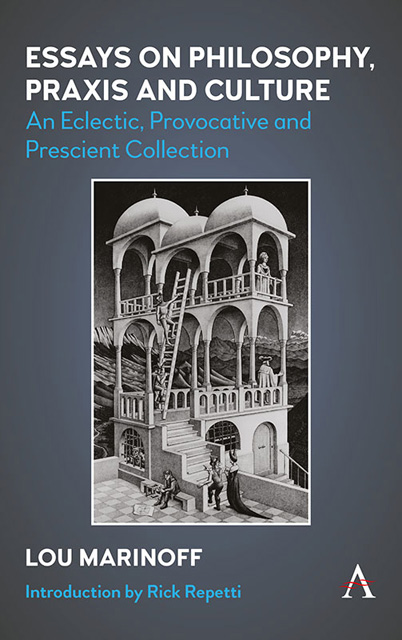Essay #2 - What Philosophical Counseling Can’t Do
Published online by Cambridge University Press: 10 January 2023
Summary
This essay was originally read at the Eastern Division conference of the American Philosophical Association in 1998, at a meeting of the (now defunct) American Society for Philosophy, Counseling and Psychotherapy.
The essay is republished here by permission of the Philosophy Documentation Center.
The original citation is:
Marinoff, Lou. “What Philosophical Counseling Can’t Do.” Philosophy in the Contemporary World 5, no. 4 (Winter 1998), 33–41. https://doi.org/10.5840/pcw19985420
Introduction
Philosophical counseling is attracting a lot of attention these days, primarily because of what it can do. As those of you who dispense philosophical counseling know, it can help clients resolve or manage a host of problems—whether personal, marital, moral, ethical, axiological, or political—problems entailed by the normal human condition, but not themselves entailing anything resembling “mental illness.” It is normal to experience problems; unhelpful to seek inappropriate solutions; prudent to seek appropriate ones. If the root cause of one’s difficulty is not so much the brute fact of circumstance in one’s game of life but rather the internal rules by which one happens to be playing—which can include matters of belief, articles of faith, interpretations of experience, and a host of unexamined but influential premises—then one’s rules themselves, one’s justification for holding them, one’s inferences from them, and the nature of their relation to the situation at hand, all reside in the province of philosophical counseling.
The philosophical counselor does not necessarily furnish raw materials; the client (and particularly the client who has been in psychotherapy) provides an over-abundance of these. The counselor usually contributes to constructing some philosophical framework for locating the problem and its possible resolutions; that framework could consist of critical thinking, moral reasoning, existential analysis, Socratic elenchus, Buddhist non-attachment, or a referral to some other counseling professional.
In sum, since there is growing awareness that philosophical counseling can help homo sapiens, and since homo sapiens perennially needs all the help he can get, philosophical counselors can make a valuable contribution to the human estate.
Having said this much, or rather this little, of what philosophical counseling can do, and why it is attracting attention for doing so, I have already revealed a secondary reason for its growing popularity.
- Type
- Chapter
- Information
- Essays on Philosophy, Praxis and CultureAn Eclectic, Provocative and Prescient Collection, pp. 39 - 54Publisher: Anthem PressPrint publication year: 2022

